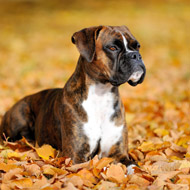
Rescue workers fear being inundated next year
The John Lewis Christmas advert, which sees a boxer dog jumping on a trampoline, has sent online searches for boxer puppies to record highs, according to new figures.
Published by the Kennel Club, the figures show that searches for the breed on its Find A Puppy website rose by 160 per cent on the day following the release of the advert.
Furthermore, in the five days after the advert’s release, searches were up a total of 169 per cent. Searches for all breeds of dog were only up four percent in the same time period.
“When there is a sudden and enormous spike in people searching for puppies within a breed that is in the media spotlight, we all too often see the same breed overflowing from rescue centres a few months later,” commented Caroline Kisko, Kennel Club secretary.
“It is understandable that adverts, films and other media will feature and celebrate dogs given that we are a nation of dog lovers, but the Boxer breed could be in real trouble if people let impulsiveness take over and rush out to buy one without knowing much about the breed.”
In light of the figures, the Kennel Club are reminding potential owners about the importance of research to prevent dogs needlessly ending up in rescue. The organisation strongly urges anyone who is serious about getting a boxer to go to a responsible breeder or consider a rescue dog.
Betty Head of the Southern Boxer Rescue Service has voiced concern about seeing an influx of boxers through her doors in the New Year.
“Boxers are absolutely wonderful characters but we fear being inundated next year, after the interest the John Lewis advert has generated in the breed,” she said. “We saw lots of Boxers called George coming into us after the Colman’s Mustard ad featuring a Boxer, so we know it happens.”
To educate people on boxers the Kennel Club has launched a ‘Living with Buster’ web page to show the reality of living with the boxer breed. To find out more visit: www.thekennelclub.org.uk/livingwithbuster.



 The Animal and Plant Health Agency (APHA) has updated its online reporting service for dead wild birds.
The Animal and Plant Health Agency (APHA) has updated its online reporting service for dead wild birds.